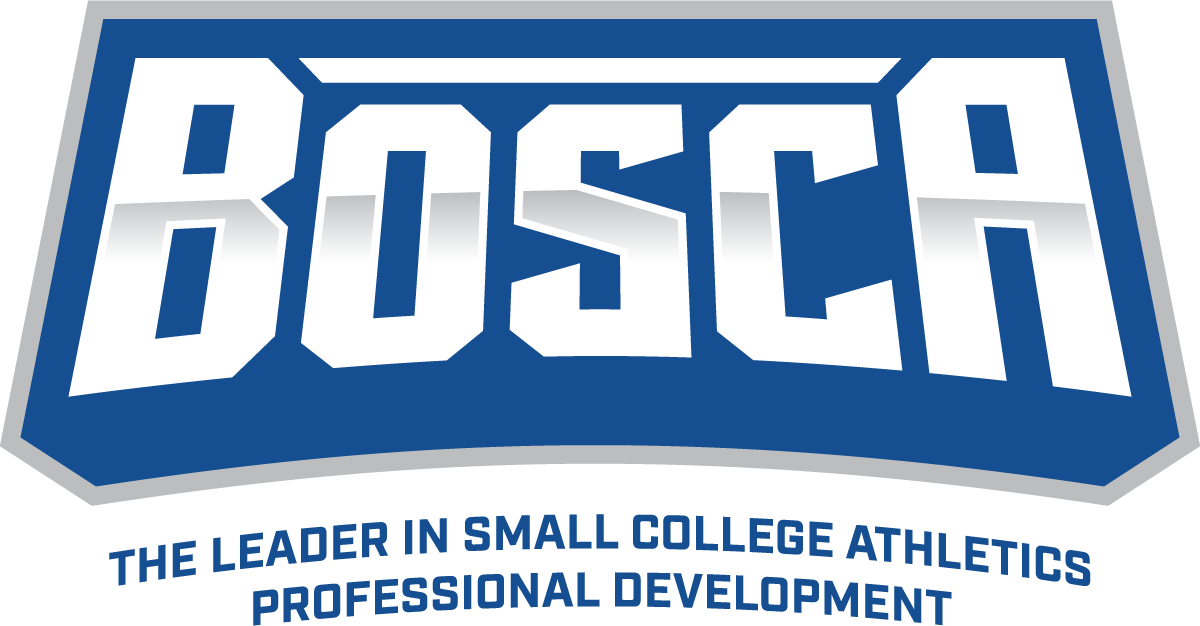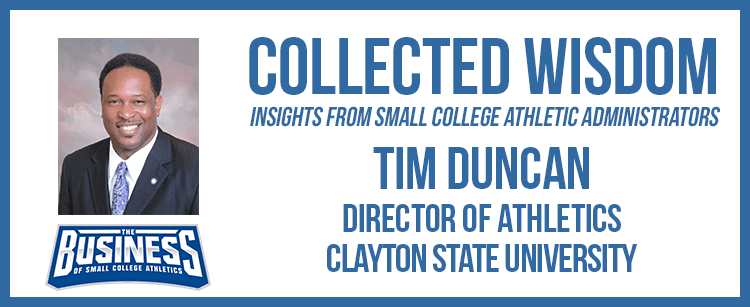Collected Wisdom - Tim Duncan
Athletic Director - Clayton State University NCAA D2
Collected Wisdom is a series of interviews featuring insights from Small College Athletic Administrators. Our thanks to Tim Duncan
, Athletic Director at Clayton State University, for participating this week.
How did you get started in College
Athletics?
I got my start in Athletics by accident. After working in sports marketing for Russell Athletic and RJ Reynolds Tobacco Company, I was a partner in InfraRed Marketing, an event marketing company. I made a business call to my alma mater, the University of Memphis, to discuss working with them on a project. After the conversation, Bill Lansden, the former Associate AD for Development there, asked me if I was interested in applying for the Director of the M Club position. The M Club is the student-athlete alumni group for Athletics and is housed within the Athletics Development area at UM. I told him yes and the rest, as they say, is history.
You were a successful college
student-athlete at Memphis State. How
does your experience as a student guide your decisions as an athletic
administrator?
I’m not sure how successful I was since my kids laugh at me for averaging only 3 points and 3 rebounds off the bench for the men’s basketball team! However, my experience as a student-athlete helped to shape my perspective as an administrator.
I want to have solid, personal
relationships with as many student-athletes as I can. That stemmed from me playing basketball and
not having a substantive conversation with my athletic director during my time
at Memphis. I work hard to get to know
them, their interests (on and off the field of play), and their goals after
graduation. To aid in that relationship
building, I attend practices, games, their extracurricular activities like a
theater performance or fraternity/sorority events. But the ace in my hand is the big bowl of
candy I keep on the conference table in my office. I fill it up twice per week for students to
stop by and grab some. While they do
that, I get to be a little intrusive - asking 1 or 2 quick questions to help me
learn them better. That practice has
been invaluable!
In a short period of time at
Clayton State you have made several hires.
What is the key to navigate a successful hiring process?
The key to navigate a successful hiring process is preparation and diligence. Before a hire arises, I assess what personalities, values, and experience levels seem to work at Clayton State. I then try to target individuals who meet those criteria. During the interview process, I want feedback from people on my senior staff and maybe across campus depending on the role. It is still an inexact science but preparation and diligence have allowed me to minimize missteps in hiring.
What is the biggest challenge
that you face as a small college athletic administrator?
Resources, resources and did I mention resources? Clayton State University is a Division II public institution within the University System of Georgia (USG). Within the USG system, Clayton State University cannot spend dollars on Athletics or any other auxiliary unit. Our revenue streams include: student fees, tickets sales, concessions, gym rentals, and fund-raising. For the first time since 2011, our department has raised more money than we have spent for two consecutive fiscal years. That is a huge accomplishment and a testament to our coaches, staff and student-athletes for making huge sacrifices. Revenue generation is extremely critical for NAIA and NCAA institutions outside of Division I. Being able to secure enough financial resources to support student-athletes and sport programs is the difference in a thriving department and the unemployment line.
What is your favorite part of your job?
I actually have two favorite parts of my job. The first is spending time with student-athletes. Whether they stop in my office and ask me to write a recommendation letter or talking to them and their parents after a game, I truly enjoy getting to know them. I want to be a person who is instrumental in them acquiring a job, gaining acceptance to graduate school, or simply discussing the merits of joining a fraternity or sorority during college.
My second favorite part is telling our
story to donors, corporate sponsors and fans.
Our student-athlete population is smart (over 50% regularly attain 3.0
grade point averages), diverse (1/3 of them are international students), and
talented, and I have the pleasure of sharing their stories with individuals who
choose to make a donation to our program to support them in some very tangible
way. Securing a gift (of any size) to
support our student-athletes is an awesome feeling and one I do not take for
granted.
Who are some of your
mentors/people that have encouraged you along the way?
My first two mentors in Athletics are Bill Lansden, my first boss and the person who hired me at Memphis. He is now the Senior Associate AD of Development and Executive Director of the Hokie Club at Virginia Tech. The other is Dr. Derrick Gragg, Vice President and Director of Athletics at the University of Tulsa.
They are both good
family men who do tremendous jobs of balancing family and high demanding
jobs. They are excellent listeners and both
of them had a strange belief in me that I could become an Athletic Director,
even before I truly realized I wanted to do it myself. I have several other mentors, but those two
have been there for me before Day 1 of this journey.
A few years ago you started
the Emerging Administrators Academy.
What was your motivation to start this and what does the academy entail?
My story was the motivation for initially starting Emerging Administrators Academy (Emerging AD). I wanted to create a platform for people outside of athletics who were interested in making the transition into the profession. However, over the years it has transitioned to a professional development opportunity for current administrators looking to advance their careers. Our panelists include some of the top Directors of Athletics and Senior Staff members in each division of the NCAA and several from NAIA. Our mission is to assist in the development of 100 administrators who ultimately become Directors of Athletics.
Best career advice that you
have received?
The best advice I have received is “Remember your why”. Although I have heard it many times, it first resonated with me when Dr. Percy Caldwell, the former Winston-Salem State University and Fort Valley State University Director of Athletics, said it at the inaugural Emerging AD.
What advice do you have for
young people that are looking to start a career in college athletics?
The advice I give young people interested in working in college athletics is after their entry-level position, make sure you research the person or persons you want to work for prior to the interview. I have found that the leaders I have worked for whom I enjoyed the most have made a personal investment in my career and in me as a person. I would not have become an Athletics Director four years after I started in the business without being surrounding by great leaders.
You have worked in larger DI
departments and now smaller colleges.
What are the primary differences between the two?
The primary difference between working at Division I and Division II institutions, is silos. At most Division I institutions, administrators work in their areas exclusively. Whereas at Division II institutions, many administrators wear hats in multiple areas. Depending on your experience and preference, one may be better fit than the other.
How do you balance your
personal and professional life?
I balance my personal and professional life by incorporating my family into as many “work” events as possible. In the past, my kids have attended games and have worked in concessions, passed out game programs and even worked the shot clock. They also attend summer camps. In fact, my 10-year old daughter is here with me right now as I answer these questions. School in our county starts back tomorrow so today she wanted to come to work and hang out with dad.
I also encourage our
staff to incorporate their families into events, when appropriate. Many of our coaches have young kids and I
remember when my kids were younger and we lived in areas with no family. My supervisor at the time did not embrace a
kid-friendly atmosphere. When my kids
got sick at school or daycare, Lisa, my wife, or I had to leave work and take my
son or daughter home and stay there with them for the remainder of that day and
sometimes the next day. After
experiencing situation a few times, I said if I am ever “the boss” I would
allow my staff to bring their kids in on sick days for a few hours if needed.
These jobs in
athletics can be extremely time consuming so encouraging a parent to bring
their kids to work in a pinch can be the difference in a coach or staff member making a lateral move to be closer to family
or making Clayton State and the Atlanta-area their home.
What is your favorite moment
in sports?
My favorite moment in sports immediately preceded my worst. I worked in Development at my alma mater, the University of Memphis and we made it to the NCAA Men’s Basketball Championship in 2008. We played Kansas and were up 9 with 1:39 remaining in the game.
I was responsible for providing tickets to and entertaining former student-athletes who were current or former professional athletes. That group included: Penny Hardaway and Elliot Perry (my former teammates), Issac Bruce, DeAngelo Williams (NFL players) and a host of other successful former Tigers. We were slapping high fives and barely contained ourselves from running out on the court before the time expired.
Well thanks to a bunch of missed free throws and a miracle shot by
Mario Chalmers, we still have not experienced a National Championship!
You attended the Business of
Small College Athletics workshop this past year. What would you tell someone that is considering
attending?
I have actually told a few people to consider attending the Business of Small College Athletics (BOSCA) conference next year. I have told external people that the most creative individuals in our industry work in small colleges where we have to make dollars stretch. Some of the ideas and contacts made at BOSCA have been invaluable to our planning for this year and next.
I think it is a great place for our internal (compliance, academics, facilities management) colleagues to attend also. It will provide them with a solid base for increasing revenue, event planning, and the fundamentals of development. It is a must attend event and I will absolutely be back in the future!


